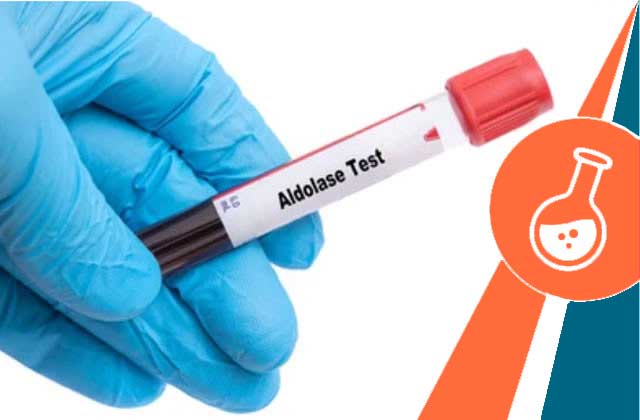Aldolase and its Function
Aldolase is a key enzyme involved in carbohydrate metabolism, playing a crucial role in the breakdown and synthesis of glucose for energy production and maintenance of glucose homeostasis in the body.
Conditions that may require Aldolase Test
The aldolase test, which measures the levels of aldolase enzyme in the blood, is primarily used as a diagnostic tool for certain medical conditions. Here are some conditions that may require an aldolase test:
- Muscle Disorders: Elevated levels of aldolase can be observed in various muscle disorders, including muscular dystrophy, polymyositis, dermatomyositis, and inclusion body myositis. The aldolase test is often used as an adjunct to other diagnostic tests, such as creatine kinase (CK) levels and electromyography (EMG), to assess muscle damage or inflammation.
- Liver Diseases: Liver diseases that involve hepatocellular damage or destruction, such as viral hepatitis (especially hepatitis A), alcoholic hepatitis, and liver tumors, can cause an increase in aldolase levels. The aldolase test may be used in combination with other liver function tests to evaluate liver health and assess the severity or progression of liver disease.
- Connective Tissue Disorders: Some connective tissue disorders, such as systemic lupus erythematosus (SLE) and rheumatoid arthritis, may lead to elevated aldolase levels. The aldolase test, along with other laboratory and clinical evaluations, can be helpful in diagnosing and monitoring these conditions.
- Certain Cancers: Elevated aldolase levels can be seen in certain cancers, including pancreatic cancer, liver cancer, and lung cancer. However, it is important to note that aldolase is not specific to cancer and should be interpreted in the context of other diagnostic tests and clinical findings.
- Other Conditions: Elevated aldolase levels can also be observed in various other conditions, such as myocardial infarction (heart attack), myopathy due to drug toxicity, and hypothyroidism. The aldolase test may be ordered as part of a comprehensive evaluation to help diagnose or monitor these conditions.
Aldolase Test Procedure
The Aldolase test is performed by drawing a blood sample from a vein in your arm. Our phlebotomist, will clean the site with an antiseptic and apply a tourniquet to make the veins more visible. He will then insert a sterile needle into a vein and collect the required amount of blood into a collection tube.
Interpreting Aldolase Test Results
Interpreting aldolase test results involves comparing the measured levels of aldolase in the blood with the reference range provided by the laboratory. The reference range may vary slightly depending on the specific laboratory and testing method used. Here are some general guidelines for interpreting aldolase test results:
- Normal Range: The normal range for aldolase levels can vary between laboratories, but typically falls within the range of 1 to 8 units per liter (U/L) or 0.02 to 0.13 micrograms per milliliter (mcg/mL). It’s important to note that the specific reference range provided by the laboratory should be used for accurate interpretation.
- Elevated Levels: Elevated aldolase levels may indicate various medical conditions, such as muscle disorders, liver diseases, and certain cancers. However, aldolase is not specific to any particular condition, so additional tests and clinical evaluation are usually required for accurate diagnosis. The severity of the elevation can also provide some insight into the extent of the condition.
- Trend Analysis: Comparing aldolase levels over time can be useful in monitoring the progression or response to treatment of certain conditions. A consistent increase in aldolase levels may indicate disease progression or inadequate response to therapy. Conversely, a decrease in aldolase levels may indicate improvement or successful treatment.
- Clinical Correlation: The interpretation of aldolase test results should always be done in the context of the patient’s clinical presentation, medical history, and other diagnostic tests. Elevated aldolase levels should be correlated with symptoms, physical examination findings, and results from other relevant investigations to determine the underlying cause.
Treatment for High Aldolase levels
High aldolase levels in the blood can be indicative of various underlying conditions. The treatment for elevated aldolase levels depends on identifying and addressing the specific cause of the elevation. Here are some examples of conditions that may result in high aldolase levels and their respective treatment approaches:
- Muscle Disorders: Elevated aldolase levels are often seen in muscle disorders such as muscular dystrophy, polymyositis, dermatomyositis, and inclusion body myositis. Treatment for these conditions typically involves a multidisciplinary approach and may include medications to manage inflammation (such as corticosteroids or immunosuppressants), physical therapy to improve muscle strength and function, and supportive care to manage symptoms.
- Liver Diseases: Certain liver diseases, such as viral hepatitis, alcoholic hepatitis, and liver tumors, can cause increased aldolase levels. The specific treatment for these conditions depends on the underlying cause. For viral hepatitis, antiviral medications may be prescribed. In cases of liver tumors, treatment options may include surgery, chemotherapy, radiation therapy, or a combination of these approaches. Alcoholic hepatitis may require cessation of alcohol consumption and supportive care.
- Connective Tissue Disorders: High aldolase levels can be seen in connective tissue disorders like systemic lupus erythematosus (SLE) and rheumatoid arthritis. Treatment for these conditions typically involves a combination of medications to manage inflammation, relieve symptoms, and modify the course of the disease. Nonsteroidal anti-inflammatory drugs (NSAIDs), corticosteroids, disease-modifying antirheumatic drugs (DMARDs), and biologic agents may be used, depending on the specific condition and its severity.
- Certain Cancers: Elevated aldolase levels can occur in certain cancers, such as pancreatic cancer, liver cancer, and lung cancer. Treatment for cancer varies depending on the type, stage, and other individual factors. It may involve surgical removal of tumors, chemotherapy, radiation therapy, targeted therapies, immunotherapy, or a combination of these treatments. The specific treatment plan will be determined by an oncologist.
More Related Tests
Why To Book with HealthCareOnTime

17 Crores+ Samples Processed

World Class Technology Labs

25+ Years of Trust & Experience

Free Home Collection
FAQs Around Aldolase Test
How much does Aldolase Test cost?
The Aldolase Test cost is Rs.1300, although it is now available for Rs.970 because of the offer.










